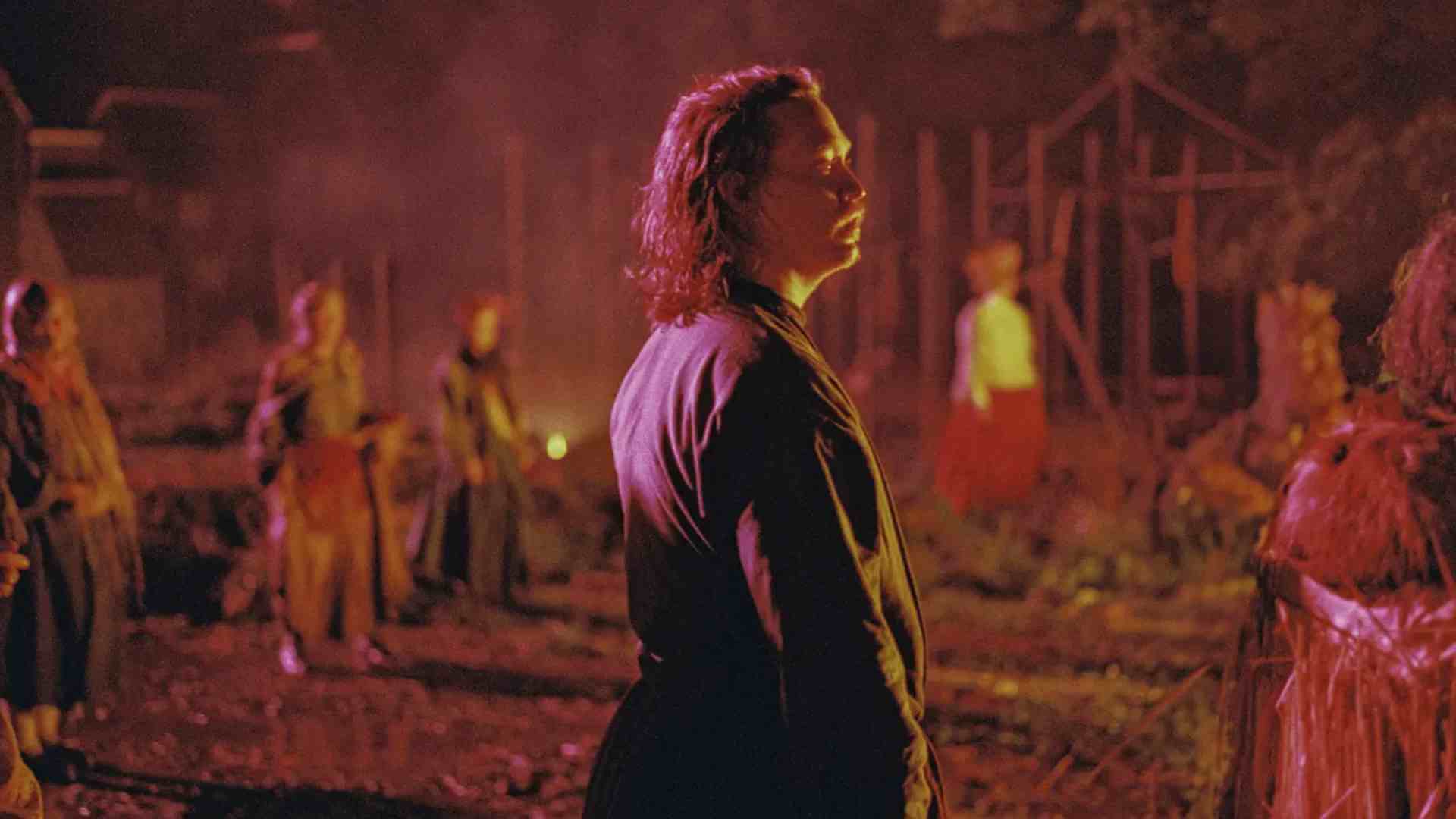“He means to throw a halter around our lives,” whispers a Scottish villager to Walter (Caleb Landry Jones), a close friend of the local ruler, Master Kent (Harry Melling). The small community of gleaners are celebrating their harvest, feasting on the fruits of their labors as a new way of life encroaches in on them. While the peasants are all “goat drunk and lecherous,” the Master proposes his plan to shift the village’s production from diverse agriculture and livestock cultivation to primarily producing sheep’s wool in order to earn greater profit. While Master Kent’s pitch has a certain democratic benevolence to it, engaging in profit sharing for those who labor on the land, it would fundamentally change everyone’s way of life. Unbeknownst to them, this change is not optional, and out of the darkness of the loch a small boat emerges carrying with it people already displaced by this strange new world of maps, fences, and optimization.
Adapted from the novel by Jim Crace, Greek filmmaker Athina Rachel Tsangari‘s Harvest is her most stylistically ambitious film since her debut The Slow Business Of Going, rendering the anarchic and naturalistic rhythms of rural feudal life into a meditation on the displacement of culture. Shot on what feels like living, breathing 16mm film by the typically textured Sean Price Williams, Harvest is a film where the people are shaped by the land even more than they would willingly shape it back.
The film opens with Jones’ freckled hands picking up a bug from dense layers of grass, gently observing in it the sunlight as the audience in turn observes the dirt under his fingernails. Jones runs his hands along the moss on a branch, biting into the bark and fingering a tree hollow before sticking his tongue in. It is at once a base defilement and a simple curiosity by one of the land’s stewards. It suggests the contradiction at the heart of Harvest: The people of the village both have a reverence for their way of life, and an impulsiveness which will not help them to maintain it.
The inciting incident comes from a barn, which burns after an apparent theft of the Master’s doves. Walter immediately knows that it is a particular group of hooligans who have caused the arson, although none are willing to come forward and take responsibility. When a group of displaced vagrants are discovered on the edges of the village, they are immediately blamed, with the men thrown in stockades and the woman having her hair cut as punishment.
The village is genuinely threatened by forces outside of it, yet they have mistaken where it is coming from and placed their fears onto outsiders. More dangerous to them is someone who at first seems benign: Mr. Earle (Arinzé Kene), or “Quill” as the villagers call him because of his constant scribbling. Quill is a cartographer, hired by Master Kent to chart the landscape. Quill’s curiosity matches that of Walter’s, making them fast friends but also foils—while Walter tends to the land out of love, Quill maps it, and in doing so makes a physical space subject to new ideas of borders. The villagers themselves have a concept of their own boundaries, even hitting children’s heads upon their border stones in order to hammer in the idea of where they are from, but these are not the same as the modern fences that will come with things like inclosure acts, cutting off the continuity of the landscape and delineating their homes not as places to merely reap and sow but as strict property. “Your account of our land is not as honest as you hoped,” Walter tells Quill. “You flattened us.”
Straddling the line of history and a feeling of surreal atemporality, Tsangari’s film is particularly striking in 2025, calling to mind current crises of immigration still derived from imperialism-driven political unrest back at home, or the colonial displacement of Palestinians by Israeli landgrabs which have culminated in the ongoing genocide in Gaza. Harvest is a film about capitalism, at first quietly and then like a blunt object to the skull. Simmering beneath that ultimate disruption, though, is a sense of communal collapse that is already creeping under everything.
This is what makes Harvest more abstract than a simple metaphor for current events, and turns the film into what Tsangari has called a “fable, almost a children’s spooky story, about being passive and gullible observers to all this catastrophe that’s going on around us.” This point will likely (sadly) maintain the film’s prescience well into the future—before the community resigned to its outside forces, it had already stopped stewarding itself.
Director: Athina Rachel Tsangari
Writer: Athina Rachel Tsangari, Joslyn Barnes
Starring: Caleb Landry Jones, Harry Melling, Rosy McEwen, Arinzé Kene, Thalissa Teixeira, Frank Dillane
Release Date: August 1, 2025

 Keep scrolling for more great stories.
Keep scrolling for more great stories.
